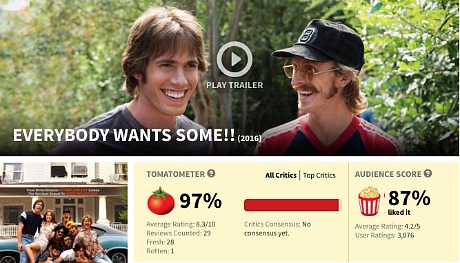A couple of weeks ago I noted that the almost uniformly positive reactions to Jeff Nichols‘ Midnight Special were due to the fact that (a) critics have decided Nichols is one of the auteurist good guys and a likable one at that, and therefore (b) any semi-coherent film he makes gets at least a pass if not a thumbs-up. The same thing seems to be happening now with Richard Linklater and his latest film, Everybody Wants Some!, which currently has ratings of 97% and 84% on Rotten Tomatoes and Metacritic, respectively.

It’s not that critics are being too kind (although I think some of them are) but most are not really levelling with their readers. Which is why people don’t trust them. They know/sense that critics live in their own elite realm, and that they always seem to write about this realm (self-regarding, navel-gazing) rather than the one inhabited by ticket-buyers.
There’s obviously nothing wrong with recognizing and celebrating Linklater’s exceptional vision and extraordinary focus, but at the same time you have to at least mention that Everybody Wants Some! doesn’t tell anything close to a story, and that there are millions of Joe Popcorns out there who go to movies expecting some kind of narrative with a beginning, a middle and an end. It’s fine to say “this is better than the usual-usual, and it’s so special that it doesn’t need to tell a story”…no problem with that. But you have to at least admit that the none-too-hips are going to have a problem with a movie that ignores the playbook and makes up its own whimsical music as it goes along.
Here, by the way, is a review I agree with (or which agrees with mine), from Consequence of Sound‘s Michael Roffman:
The repetitive, high-testosterone, all-jock scheme “plagues and stunts the loose narrative of Everybody Wants Some!!,” he says. “Try to imagine spending three days with the biggest assholes across the quad, the intolerable band of misfits who are loud, obnoxious, and unaware. They’re walking Van Halen songs, living out this intoxicating life of teenage dreams that was scribbled out from reading way too many issues of Playboy magazine while growing up.
“Granted, none of this would be such an issue if Linklater weren’t so beholden to this rickety house of semen-pulsing muscle. Rather than expand the story and involve a rogues gallery of corollary characters — such as Zoey Deutch’s Beverly, who becomes a beacon of light 60% of the way through the film — we’re stuck with a group of guys who drink, duel, and dance. A lot of it’s funny — for instance, any scenes involving Powell’s admittedly charming Finnegan or Hoechlin’s testy McReynolds — but hanging out with these guys eventually becomes a chore.
“There isn’t a single stake for any character in this film, and while some may argue that’s never been Linklater’s prerogative, a quick look back on his most naturalistic filmmaking will yield [a] remarkable sense of tension.
“Instead, the film is surprisingly (and unnecessarily) gratuitous. Linklater also tends to overindulge in his trademarks, twisting the meandering narrative into on-the-nose tangents of pseudo-philosophical diatribes that worked for Dazed and Confused because they were relegated to short 30- or 45-second bursts. Here, it feels like being cornered at a house party with someone who reeks of cheap beer and is all too proud about using their general requirements on introductory philosophy and psychology courses.”









